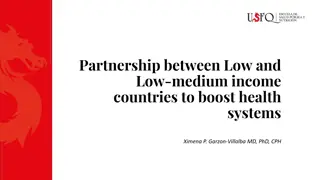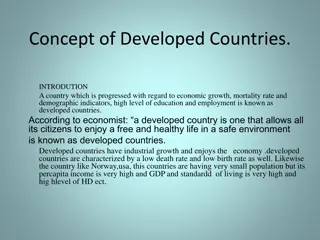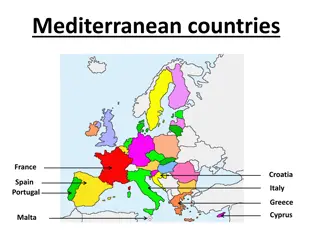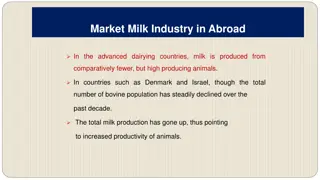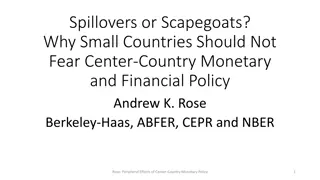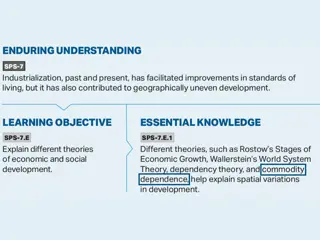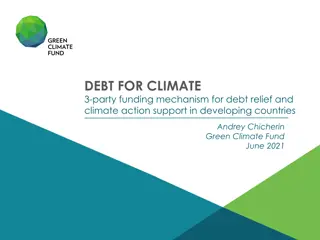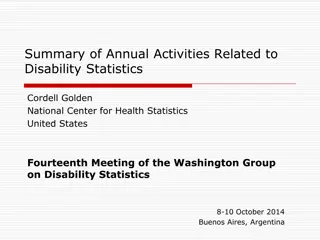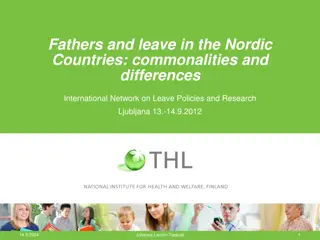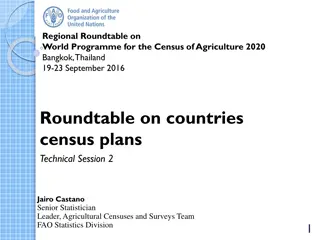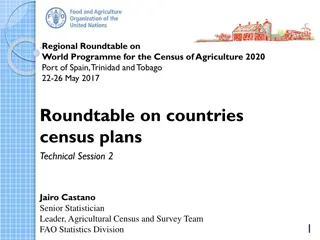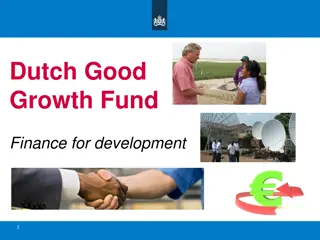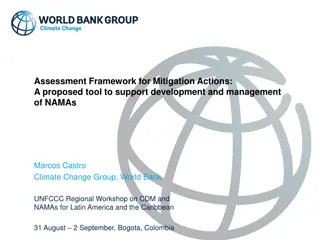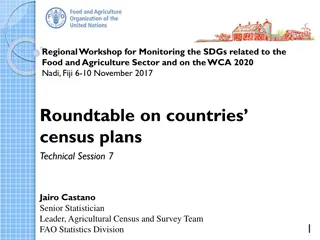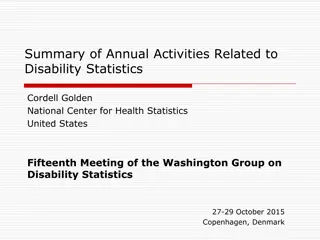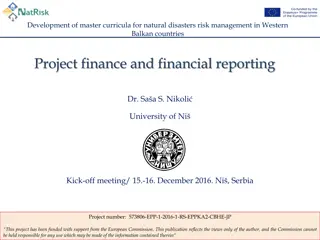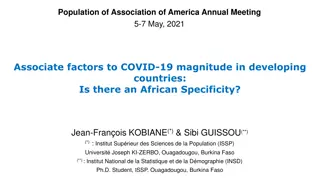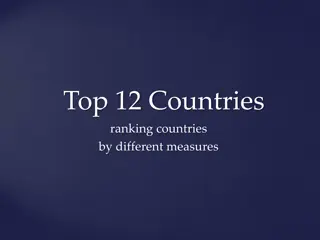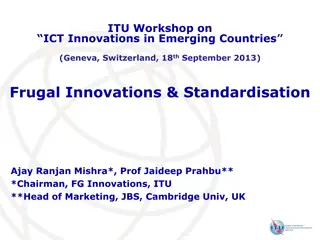Geospatial Comparison of Economic Change and Climate Disasters in Asia-Pacific
This study explores the impact of natural disasters on economic indicators in Southern and Western Asian countries over time, aiming to assist in policy-making by understanding the relationship between natural disasters and the economy. It discusses the increasing incidences of extreme weather event
4 views • 18 slides
Physician Satisfaction Levels in High-Income Countries
Primary care physicians' satisfaction with their medical practices, income, quality of care, and time spent with patients varies across high-income countries. Sweden, France, and Switzerland stand out for higher overall satisfaction levels, while concerns over quality of care since the COVID-19 pand
4 views • 7 slides
Partnership between Low and Low-medium income countries to boost health. systems
This presentation highlights the common challenges faced by low and low-medium income countries in boosting their health systems, such as political instability, lack of funding, and unstructured healthcare systems. It emphasizes the importance of collaborative efforts between these countries to addr
6 views • 6 slides
Exploring Nordic and European Countries Through Maps
Discover the beauty and diversity of Nordic and European countries through a series of detailed maps showcasing countries like Greenland, Finland, Norway, Sweden, Iceland, and many others. From the stunning landscapes of Scandinavia to the rich cultural heritage of Central Europe, these maps offer a
2 views • 13 slides
Contrasting Characteristics of Developed and Developing Countries
Developed countries are characterized by high per capita income, strong GDP growth, and advanced standards of living, while developing countries exhibit lower income levels, high population growth, and challenges in technology and infrastructure. The differences extend to economic, demographic, tech
1 views • 7 slides
Overview of Mediterranean Countries in the European Union
France, Italy, and Greece are prominent Mediterranean countries in the European Union, each with unique attributes. France stands out with its semi-presidential republic system, Italy with its parliamentary republic, and Greece with its rich historical background. These countries have been EU member
0 views • 25 slides
International Economic Indicators Comparison
The data presented includes GDP per capita rankings for various countries in 2015, showcasing the economic status of nations like Qatar, Norway, and the United States. It also illustrates the growth in GDP per capita from 2006 to 2015, with countries like China and India showing significant progress
2 views • 21 slides
Peer Learning and Exchange: Advancing Gender-Responsive Climate Budgeting
Countries recently converged to discuss integrating gender and climate change into national planning and budgeting. With 16 countries and 82 government officials participating, there was a focus on gender-responsive budgeting experiences and the emerging field of gender-responsive climate budgeting.
1 views • 5 slides
Cancer Survival Rates in Europe: Trends and Disparities
Cancer survival rates in Europe have shown variations across different types of cancer and countries. While overall cancer mortality has increased over the years, some countries have experienced declines in mortality rates. Survival rates for breast cancer between 1995-2014 ranged from 74% to 89%, w
0 views • 17 slides
Exploring the Countries of Oceania
Oceania is a vast and diverse region spread across the Pacific Ocean. It includes a range of countries, each offering unique landscapes, cultures, and experiences. This presentation will take you through the key countries of Oceania, highlighting their distinct characteristics and attractions.\r\nht
7 views • 13 slides
Evolution of Milk Industry in Advanced Dairying Countries and India
The milk industry in advanced dairying countries like Denmark and India has seen significant growth and transformation over the years. With a focus on high-producing animals and improved productivity, these countries have become leaders in milk production. India, in particular, has experienced a rem
1 views • 13 slides
Overview of Development Economics and Goals
Development economics is a branch of economics that focuses on improving the economies of developing countries by targeting factors such as health, education, working conditions, and policies. It involves macroeconomic and microeconomic analysis to enhance domestic and international growth. Differen
1 views • 11 slides
Understanding the New Debt Dynamics in Low-Income Countries
Analysis of external debt levels, debt payments, and lending trends in low-income countries between 2000 and 2015 reveals challenges and risks. Nine countries are identified as being highly exposed to foreign lending, with implications for economic growth, poverty reduction, inequality, and commodit
1 views • 22 slides
Status of IPSAS Implementation in Latin American Countries
This report discusses the status of IPSAS implementation in Latin American countries as of July 27-29, 2016, with details on the objectives of the study, participating countries, methodology, and next steps. It also highlights the strategies of the Inter-American Development Bank (BID) to support th
0 views • 30 slides
Global Economic Update: High-income Economies Accelerating, Developing Countries Facing Challenges
The global economic outlook presents a contrast between high-income economies accelerating in growth while developing countries encounter challenges due to headwinds and capacity constraints. Key messages highlight the need for structural reforms to enhance outcomes. Risks include fallout from the s
4 views • 34 slides
Small Countries' Resilience Against Center-Country Monetary Policies
Small countries should not fear the monetary and financial policies of larger center countries. This article discusses the potential spillovers of unconventional monetary policies by center countries, such as quantitative easing and negative nominal interest rates. It explores the concept of currenc
0 views • 39 slides
Analysis of Global Commodity Export Dependence Trends 2013-2017
The analysis includes data from the State of Commodity Dependence 2019 PDF, focusing on the degree of commodity export dependence of countries worldwide from 2013 to 2017. It examines specific countries falling into different percentage categories and explores the factors contributing to their posit
0 views • 11 slides
Three-Party Funding Mechanism for Debt Relief and Climate Action Support in Developing Countries
Developing countries require significant financial support to address climate vulnerabilities, surpassing current commitments from developed nations. A suggested three-party funding mechanism aims to facilitate ongoing funding for climate projects while providing debt relief to vulnerable countries,
0 views • 11 slides
Global Overview of Disability Statistics Activities
The annual activities related to disability statistics at the Fourteenth Meeting of the Washington Group on Disability Statistics in 2014 included participation from 44 countries across different regions. The meeting discussed new and updated information from various countries, monitoring the use of
0 views • 18 slides
Fathers and Parental Leave Policies in the Nordic Countries: Insights and Challenges
The Nordic countries have a long history of promoting parental leave and gender equality. Despite progressive policies, challenges remain in achieving equal parental leave uptake between mothers and fathers. This impacts women's position in the labor market and men's role in the family. The high fer
0 views • 13 slides
Regulations on Religious Freedom in ASEAN Countries
Religious freedom in ASEAN countries is explored, covering religious diversity, domestic laws, and regional/international obligations. The main religions in ASEAN are Islam, Buddhism, and Christianity. Various countries ensure the freedom to practice religions, with provisions to protect public safe
0 views • 12 slides
Overview of Agricultural Census Participation in Asian Countries
This text highlights the participation of Asian countries in agricultural censuses during the World Programme for the Census of Agriculture (WCA) rounds in 2010 and planned for 2020. It provides insights into the countries that conducted agricultural censuses, their respective plans for the upcoming
0 views • 14 slides
Understanding Policy Pro-cyclicality in Macroeconomic Theory
Delve into the concept of policy pro-cyclicality in macroeconomic theory through the insights shared by Jeffrey Frankel at a seminar at Harvard Economics Department. Explore examples of pro-cyclicality in developing countries, euro periphery countries, and US political scenarios, along with discussi
0 views • 42 slides
Regional Roundtable on World Programme for the Census of Agriculture 2020
The Regional Roundtable held in Port of Spain, Trinidad and Tobago in May 2017 focused on countries' census plans for the World Programme for the Census of Agriculture. The event discussed participation statistics, census rounds, and the status of FAO Caribbean countries in conducting agricultural c
0 views • 13 slides
Dutch Good Growth Fund: Financing for Development
Dutch Good Growth Fund (DGGF) is a €700 million revolving fund that provides tailored funding for sustainable and socially responsible small and medium-sized enterprises (SMEs) in low- and middle-income countries. It aims to address the financing challenges faced by SMEs, offering various financia
0 views • 9 slides
Evaluation of UNDP Support to Conflict-Affected Countries in Integrated Peace Operations
This evaluation conducted by the Evaluation Office of UNDP in May 2013 assesses how UNDP's programming supports peacebuilding in conflict-affected countries. It focuses on UNDP's role in transitioning countries from immediate post-conflict to development stages and evaluates the effectiveness of res
0 views • 12 slides
Florida Linkage Institutes: Securing International Students for In-state Tuition
The Florida Linkage Institutes program, established in 1986 by the Florida Legislature, facilitates educational and social exchanges between Florida and various foreign countries. It offers tuition exemptions for international students from select countries studying at Florida community colleges and
0 views • 10 slides
Managing Health Financing Volatility in Developing Countries
Health financing volatility in developing countries poses challenges that lead to value destruction and adverse impacts on procurement systems and end users. Examples of negative impacts include stock-outs, higher costs, and additional emergency expenses due to unpredictable aid disbursements. Lever
0 views • 7 slides
Assessment Framework for Mitigation Actions: A Tool for NAMA Development
This proposed tool supports the development and management of Nationally Appropriate Mitigation Actions (NAMAs) by providing a structured approach to assess and prioritize different mitigation programs. The tool is designed to assist developing countries, donor countries, and private investors in ev
0 views • 20 slides
Global Financial Safety Net Inequalities for Developing Countries
The article discusses the inequalities in the global financial safety net for developing countries and emerging markets, focusing on the challenges faced by countries with unsustainable debt. It explores initiatives like the Debt Service Suspension Initiative and the G20 Common Framework to address
0 views • 27 slides
Regional Workshop for Monitoring the SDGs Related to Food and Agriculture Sector in WCA 2020
The regional workshop in Nadi, Fiji focused on monitoring progress towards Sustainable Development Goals (SDGs) in the food and agriculture sector, with a special session on countries' census plans. Various statistics and data related to participation in the workshop, FAO member countries' involveme
0 views • 14 slides
Global Insights on Disability Statistics and Monitoring Efforts
The Annual Activities Related to Disability Statistics presented at the Washington Group meeting in 2015 in Copenhagen highlighted participation from 57 countries across Africa/Middle East, Asia/Pacific, Europe, and North/South America. The report showcased new information from 17 countries and upda
0 views • 21 slides
Enhancing Service Delivery in Pacific Island Countries Through ICTs
This study delves into the use of Information and Communication Technologies (ICTs) to improve service delivery in the public sector of four Pacific Island Countries (PICs): Palau, Samoa, Kiribati, and the Solomon Islands. The study presents the current status of ICTs, identifies barriers impacting
0 views • 57 slides
Mastering Natural Disasters: Curriculum Development in Western Balkan Countries
This project, funded by the European Commission, aims to enhance risk management of natural disasters in Western Balkan countries through the development of master curricula. Led by Dr. Saa S. Nikolic at the University of Ni, the project involves multiple partners from different countries. The budge
0 views • 26 slides
Overview of Digital Switchover Plan in SATRC Countries
The study discusses the importance and necessity of Digital Switchover (DSO) in SATRC countries, highlighting the transition from analogue to digital TV and radio. It covers the global trends in digital broadcasting standards, the status of DSO in various countries like India, and the need for harmo
0 views • 16 slides
Comparative Study of Sales Tax on Services in Various Countries
This content provides information on the scope and implementation of sales tax on services in different countries like Pakistan, India, Australia, Canada, France, Japan, and Malaysia. It highlights the VAT/GST regimes across the globe, the number of countries implementing VAT/GST by region, and coun
0 views • 55 slides
Factors Influencing COVID-19 Magnitude in Developing Countries: African Specificity
An exploration of factors influencing the magnitude of COVID-19 in developing countries, with a focus on any African specificity. The study uses diverse data from various developing countries to investigate the impact of demographic, economic, social service access, environmental, climatic, and heal
0 views • 16 slides
Exploring the Top 12 Countries by Size, Population, and Economy
Unveil the top 12 largest countries in the world based on various measures like size, population, and economy. Discover why some large countries are not among the most populous or economically strong. Delve into the relationship between wealth, size, and population in these countries.
0 views • 9 slides
Impact of Standardization on Economic Growth in Emerging Countries
Standardization plays a crucial role in the economic growth of emerging countries by contributing significantly to GDP growth and labor productivity. Case studies from countries like Germany, UK, Canada, and Australia highlight the positive impact of standards on innovation and overall economic perf
0 views • 8 slides
Safflower: Overview of Cultivation, Climate, and Global Scenario
Safflower, scientifically known as Carthamus tinctorius L., is a versatile oilseed crop cultivated in various countries. The plant is characterized by its thistle-like appearance, branching structure, and cross-pollination nature. Safflower is adaptable to different climates, preferring drier areas
0 views • 29 slides


